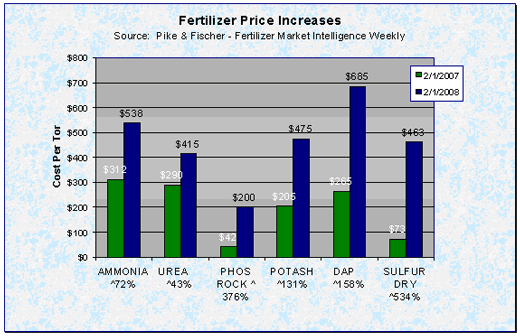Soaring Prices and Warm Temperatures Impact Early Season
April 23, 2008
The higher cost of oil is squeezing our wallets and beginning to alter lifestyles. The impacts are shocking each time we fill up the gas tanks or receive the oil bill. High gasoline and diesel prices are having a similar impact on golf course maintenance operations. One example involves the rocketing cost of fertilizers, many of which are derived from petroleum.
Oil is a primary resource used in the production of many nitrogen fertilizers. The higher cost of oil, a weaker dollar, and increased agricultural demand for fertilizer has resulted in substantial cost increases for these materials. For example, the cost of ammonia has increased 72%, urea 43%, phosphate rock 376%, potash 131%, diammonium phosphate 158%, and sulfur 534% over a 12 month period from through February 2008. Fertilizer costs usually constitute around 4-5% of the total operating budget at many Northeastern golf courses, which is not huge, but coupled with increases in fuel costs, delivery charges, and pesticides and other materials, we can anticipate higher than expected operating costs in the summer ahead. This is not good news for golf course operations where pressures are increasing to tighten budgets and control costs.

The warm, dry weather experienced in the past week has been a welcomed relief. Most of the region is once again seeing grass, and any remaining snow pack is quickly receding. The warm temperatures have been perfect for stimulating growth and for the seed germination critical for the recovery efforts that are underway on golf courses that suffered damage from snow mold disease or cold temperature injury. It is dry and irrigation programs are ramping up to keep young seedling plants alive and combat the wilt caused by the dry weather and early summer like temperatures.
Even annual bluegrass weevil adults are taking advantage of the early start. Adult activity was witnessed first hand in central Massachusetts earlier this week and reports of activity to the south are dictating unusually early applications of insecticides. The warmer soil temperatures being observed will also dictate earlier preemergent herbicide applications. Is this a preview of the weather ahead? Who knows, but I wouldn't be making any plans for the beach yet.
Northeast Region Green Section- Dave Oatis, director doatis@usga.org ; Adam Moeller, agronomist amoeller@usga.org ; Jim Skorulski, senior agronomist jskorulski@usga.org .
